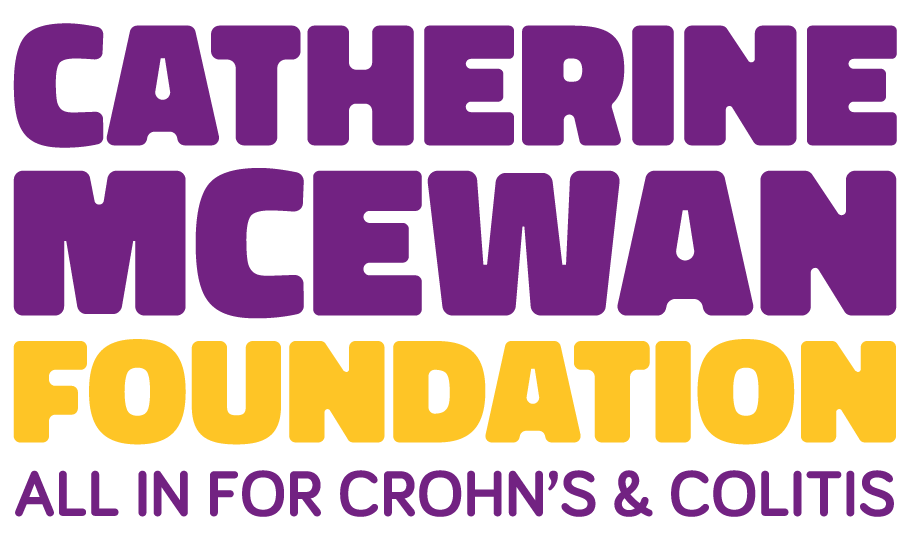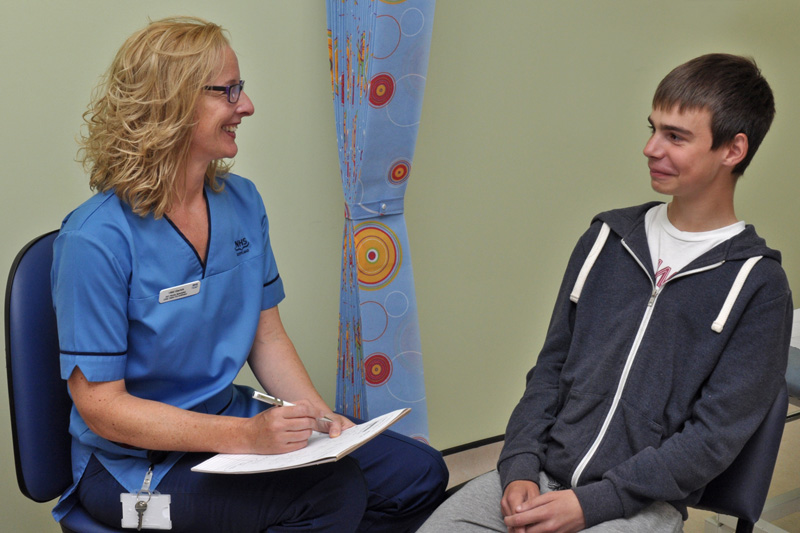Hi everyone
So – The Catherine McEwan Foundation emailed me and asked me to do a blog for the website. I, of course immediately agreed because he is an all round good guy and does loads for us and our IBD patients. It then occurred to me that I have never done anything like this before and I wasn’t really sure where to start.
At times like this I usually do one of 2 things:
1) Procrastinate (I have done this for about 2 weeks now)
2) Take a deep breath, dive in and see where it takes me (I’m doing this now)
So – here goes……
I have been an IBD Nurse specialist for 10 years. It’s a great (but hugely busy) job. No 2 days are the same; no 2 patients and families are the same. I’m really lucky to work with a great team at the Children’s Hospital in Glasgow (prev Yorkhill) – our aim is always to deliver the best for our patients. Now– sometimes that’s REALLY difficult – there just are not enough hours in the day – but we do our best because our patients deserve it. That’s the bottom line (pardon the pun!). Cheesy as that may sound, it is true.
Even after all of these years in nursing, the strength of the human spirit never ceases to amaze me. I have seen it many times in my 28yr nursing career, but I can honestly say on a day to day basis, never more than in my job as an IBD nurse. Derek foolishly told me I could talk about whatever I wanted to (he’ll soon regret that…) – so – here is what I’ve learned from my patients and families mixed in with some ‘top tips’ for managing your (or a loved one’s) IBD.
Managing IBD – what I know…….
Don’t give up – there will be days where you feel rubbish. That is the way IBD is. It’s unfair, unpredictable and unexpected, but there is nothing you can do about that. What you can do though, is foster a positive attitude towards it. Every day I see our young people with IBD cope with more than many adults will ever have to think about for the entirety of their lives. I have seen some of my patients have IV steroids in the morning, go into school to sit highers and come back into hospital in the evening for their 2nd dose of IV steroids. That is all down to a positive mental attitude, drive and determination. From what I see on a daily basis, it makes a considerable difference to how our patients cope with this upredictable condition.
Talk to people – friends, us (healthcare professionals), each other. If there is anything I have learned from doing this job for so long it’s that sharing experiences is ALWAYS cathartic. You’ll learn that you are not the ‘only one’. I remember doing a family day in the Science Centre a few years ago and I asked the audience to put their hand up if they’d had Modulen (a nutritional therapy we use a lot in kids). One by one the hands went up around the room. I told them all to keep their hands up and take a look around. That was a great moment – you could see everyone’s face change as they realised that other people had had the same experience as them. Loads of the kids spoke to me about that afterwards……
Ask questions – it’s important. Doctors and nurses are great and have loads of knowledge, but no-one knows how you feel better than you. From our perspective, it’s much better if we have a patient (or family) who are engaged in the consultation and can help guide us in advising what will work best for them as a person or family. We call it ‘tailoring therapy’ and it really works. Everyone leaves the consultation feeling like they have a positive outcome. We are here to help but it’s made so much more difficult if we don’t know what’s important to you.
Don’t panic – IBD is unpredictable, that is the nature of the condition. Flares or even just a temporary increase in symptoms can cause significant anxiety for a lot of our young people. It’s hard, we understand that, but if you are majorly stressed by every upset stomach or visit to the loo, you will have a difficult journey with this condition. Psychology, hypnotherapy and more recently experience with mindfulness techniques have been shown to be helpful in dealing with the unpredictability and chronicity of some symptoms. Ask for help with this – you GP or IBD team can point you in the right direction.
Don’t let IBD ‘drive the bus’ – take control. Do what you can to manage your IBD – take your meds, get your bloods checked, take it easy when you need to, come to your appointments, get enough sleep, eat well, exercise regularly. We are all about managing IBD proactively, we don’t like to wait until our young people are flaring – we have a really limited choice of therapies when that happens. Contact your IBD nurses or medics if you have increased symptoms for 3 days or more.
Samples – no one – and I mean NO ONE – likes giving us poo samples but they are so important. We have new and very sensitive tests now that can tell us when things are more active in the gut – even before there are any symptoms. This means we can now make changes before our young people become unwell.
We spend a lot of time chasing people for poo samples…… 🙁
Go to school/work – this sounds obvious, but from experience I see a lot of young people ‘opt out’ of school instead of ‘opting in’. This means they struggle to develop and maintain friendships and aren’t able to tap into the hugely helpful peer support they would get at school. Of course exams and achieving academic potential is also vitally important. We have many young people who get to uni – there is no reason why IBD should stop that happening.
Get involved – if you’re reading this you’re obviously already motivated to seek out information and make contact with people who have or care for someone with IBD. There is loads – and I mean LOADS of research going on in IBD. We are looking at genes, diet, gut microbiota (the bugs that live in the gut) and how we can make the most of the medicines we have in our armoury now. The Catherine McEwan Foundation has been absolutely instrumental in allowing us to be part of these large studies and design our own studies too.
It helps if you feel you are making a difference – I know this from experience because I am lucky enough to have patients who tell me I have made a difference – every day. Become a fund raiser – take part in the Catherine McEwan Foundation’s mad challenges, ‘It’s a Knock Out’, Santa bungees….. or have the time of your life at the Red Hot Ball, Tea Jenny or Comedy Crohnies.
Finally – let your IBD team know what you want. We are constantly striving to improve our service but we need your support to help us drive this forward – nothing is more powerful than the patient voice. Biased as I am, my request would be to ask for more IBD nurses as a starter for ten…… The Children’s hospital is lucky enough to have 2 and an half IBD nurses, but we still struggle to give our young people and families the support we feel they need. There is much more we would like to do
– Set up support groups for our young people
– Set up support groups for our parents
– Set up a patient panel
– Arrange more family days
– Arrange Transition evenings
– Set up a specific clinic for young people age 16 – 24yrs
That is only a few things – we have more, but Derek will have a heart attack if I don’t stop writing soon. So – I’m going to abuse this blog slightly and put a request out for anyone who wants to help in getting more IBD nurses into post to access the link below for the Crohn’s and Colitis UK –‘More IBD Nurses – Better Care’ campaign. The link is on the main web page….
www.crohnsandcolitis.org.uk
Thanks a lot!
Vikki

